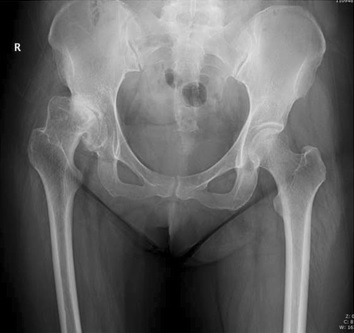Hip dysplasia
(Redirected from Hip dysplasia Beukes type)
Editor-In-Chief: Prab R Tumpati, MD
Obesity, Sleep & Internal medicine
Founder, WikiMD Wellnesspedia &
W8MD medical weight loss NYC and sleep center NYC
| Hip dysplasia | |
|---|---|

| |
| Synonyms | Developmental dysplasia of the hip (DDH), congenital hip dysplasia |
| Pronounce | N/A |
| Specialty | N/A |
| Symptoms | Hip pain, limping, uneven leg lengths |
| Complications | Osteoarthritis, hip dislocation |
| Onset | Infancy or childhood |
| Duration | Long-term |
| Types | N/A |
| Causes | Genetic factors, environmental factors |
| Risks | Family history, breech birth, female sex |
| Diagnosis | Physical examination, ultrasound, X-ray |
| Differential diagnosis | Transient synovitis, septic arthritis, Perthes disease |
| Prevention | Proper swaddling techniques |
| Treatment | Bracing, physical therapy, surgery |
| Medication | N/A |
| Prognosis | Good with early treatment |
| Frequency | 1 in 1,000 births |
| Deaths | N/A |
Hip dysplasia[edit | edit source]
Hip dysplasia is a condition that occurs when the hip joint is not properly formed, leading to instability and potential dislocation. It is most commonly diagnosed in infants, but can also occur later in life.
Causes[edit | edit source]
Hip dysplasia can be caused by a variety of factors, including genetic predisposition, breech birth, and certain cultural practices such as swaddling with the legs extended and pressed together. Genetic factors are believed to play a significant role, as the condition is more common in certain families and populations.
Symptoms[edit | edit source]
The symptoms of hip dysplasia can vary depending on the age of the individual and the severity of the condition. In infants, symptoms may include a leg that appears shorter than the other, decreased mobility on one side, and asymmetrical folds of skin on the thigh or buttocks. In older children and adults, symptoms may include hip pain, limping, and osteoarthritis.
Diagnosis[edit | edit source]
Diagnosis of hip dysplasia is typically made through a combination of physical examination and imaging studies. During a physical examination, a doctor may perform specific maneuvers to check for instability in the hip. Imaging studies, such as ultrasound in infants and x-ray in older children and adults, can provide further information about the structure of the hip joint.
Treatment[edit | edit source]
Treatment for hip dysplasia depends on the age of the individual and the severity of the condition. In infants, treatment often involves the use of a special harness or brace to hold the hip joint in the correct position. In some cases, surgery may be necessary. In adults, treatment may involve physical therapy, pain management, and in severe cases, surgery.
See also[edit | edit source]
Search WikiMD
Ad.Tired of being Overweight? Try W8MD's physician weight loss program.
Semaglutide (Ozempic / Wegovy and Tirzepatide (Mounjaro / Zepbound) available.
Advertise on WikiMD
|
WikiMD's Wellness Encyclopedia |
| Let Food Be Thy Medicine Medicine Thy Food - Hippocrates |
Translate this page: - East Asian
中文,
日本,
한국어,
South Asian
हिन्दी,
தமிழ்,
తెలుగు,
Urdu,
ಕನ್ನಡ,
Southeast Asian
Indonesian,
Vietnamese,
Thai,
မြန်မာဘာသာ,
বাংলা
European
español,
Deutsch,
français,
Greek,
português do Brasil,
polski,
română,
русский,
Nederlands,
norsk,
svenska,
suomi,
Italian
Middle Eastern & African
عربى,
Turkish,
Persian,
Hebrew,
Afrikaans,
isiZulu,
Kiswahili,
Other
Bulgarian,
Hungarian,
Czech,
Swedish,
മലയാളം,
मराठी,
ਪੰਜਾਬੀ,
ગુજરાતી,
Portuguese,
Ukrainian
Medical Disclaimer: WikiMD is not a substitute for professional medical advice. The information on WikiMD is provided as an information resource only, may be incorrect, outdated or misleading, and is not to be used or relied on for any diagnostic or treatment purposes. Please consult your health care provider before making any healthcare decisions or for guidance about a specific medical condition. WikiMD expressly disclaims responsibility, and shall have no liability, for any damages, loss, injury, or liability whatsoever suffered as a result of your reliance on the information contained in this site. By visiting this site you agree to the foregoing terms and conditions, which may from time to time be changed or supplemented by WikiMD. If you do not agree to the foregoing terms and conditions, you should not enter or use this site. See full disclaimer.
Credits:Most images are courtesy of Wikimedia commons, and templates, categories Wikipedia, licensed under CC BY SA or similar.
Contributors: Kondreddy Naveen, Prab R. Tumpati, MD


